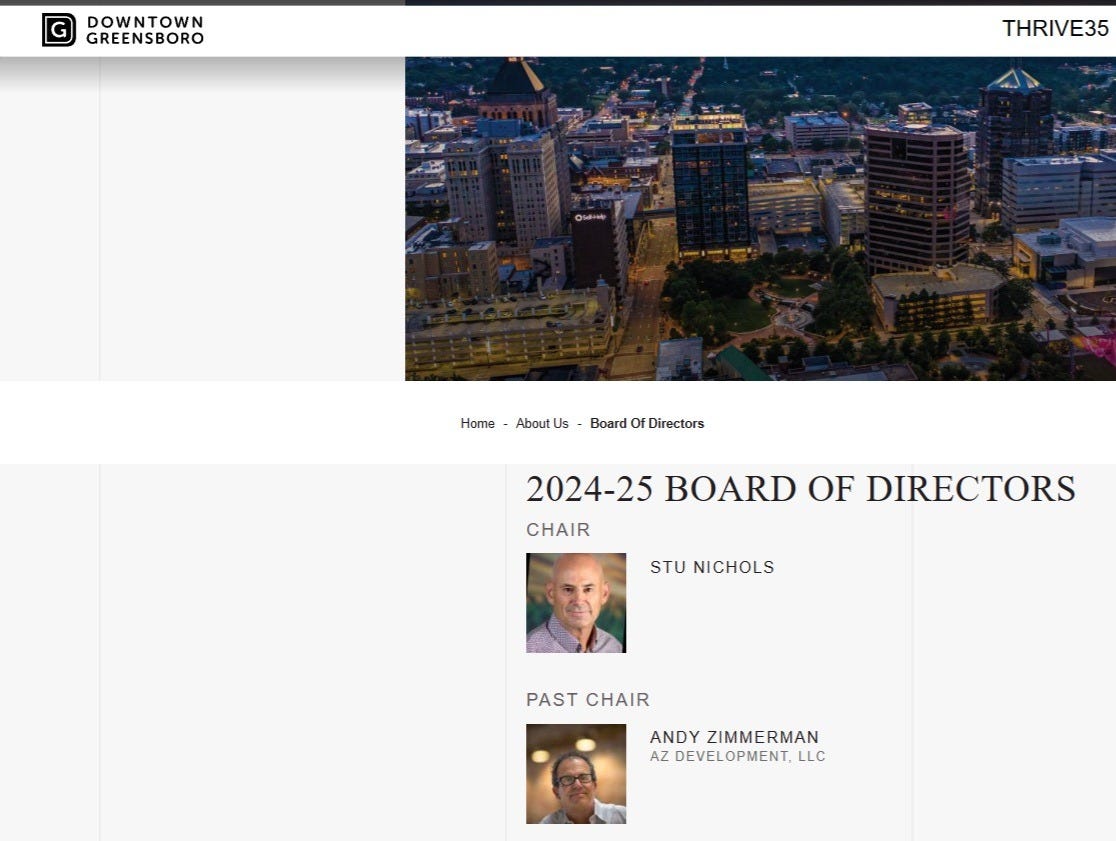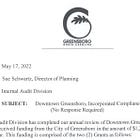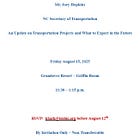Greensboro’s Insider Problem; Tuggle Duggins and Andy Zimmerman Edition
How a tight circle of power brokers shaped public boards, nonprofits and taxpayer spending to benefit their own interests.
Abstract;
A small network of politically connected attorneys, developers, and public officials in Greensboro influenced public boards, nonprofit spending and taxpayer-funded decisions to advance private interests. The article outlines how conflicts of interest, insider access and cross-connected relationships shaped development outcomes and taxpayer money allocations.
DGI board members and affiliated public officials received improper taxpayer-funded perks; Tuggle Duggins attorneys who benefited from questionable DGI spending are now defending the organization in litigation; and individuals with direct or indirect ties to former DGI Chair Andy Zimmerman participated in public decisions without recusal, contrary to city charter and state conflict-of-interest laws. The result is a system in which access, incentives and public subsidies appear to hinge not on merit, but on personal and political connections.
The investigation raises legal and ethical concerns involving nonprofit private-benefit violations, misuse of public funds, concealed audit records and compromised public decision-making. It calls for full transparency, independent oversight, enforcement of recusal rules, and a reset of governance standards to ensure that Greensboro’s development decisions serve taxpayers, not insiders who profit from them.
On Wednesday, November 5, Greensboro’s Redevelopment Commission met at City Hall to consider a project proposal for 734 S. Elm Street located downtown, from AZ Development (Andy Zimmerman). The submission had not been formally filed and was still incomplete, yet Zimmerman was permitted to present on short notice. Russ Clegg, the City’s Long Range and Strategic Planning Manager, said it was the first time he had seen the proposed version in AZ’s presentation.
Since about 2019, Zimmerman’s Gateway Center building at 620 South Elm Street has reportedly enjoyed free access to City-owned, created and maintained parking across Gate City Boulevard on the proposed site for redevelopment, to the detriment of Greensboro taxpayers.
While serving on publicly funded Downtown Greensboro Inc.’s (DGI) Board since May 21, 2015, including time as Chair and on the Executive Committee, ending June 30, 2025, Zimmerman received numerous illegal taxpayer funded meals and likely entertainment from via DGI’s CEO Zack Matheny, who is also a Greensboro City Council member until losing this year’s election to April Parker.
Former DGI interim CEO Cyndy Hayworth confirmed Matheny’s position two days earlier on May 19, 2015, in response to an email from Earl Jones, who also applied for the job and was told the position was filled. Jones later filed a discrimination complaint asserting Zack didn’t deserve the role. The News & Record reported “DGI will defend the charge vigorously, and we anticipate it being dismissed without further investigation,” attorney Nathan Duggins said via email. Duggins is a director of Tuggle Duggins, the Greensboro law firm that represents DGI.”
Tuggle Duggins’ Director Patrick S. Lineberry, appointed to the Redevelopment commission as of May 7, 2025 by Zack Matheny, attended the November 5 meeting, participated in discussions and deliberations, and was the only member who voted against the non-Zimmerman proposal.
Nancy Hoffmann, City Council Liaison to the Redevelopment Commission, who received at least one taxpayer funded perk from Matheny at Print Works Bistro and admitted to others, counseled the Commission along with Lineberry to wait for the entirety of Andy’s proposal to be submitted before moving ahead with the correctly submitted proposal by Alexander Co., which was supported 4 of the 5 commissioners, Deena Hayes-Greene, Jason Hicks and recent City Council candidate Monica Walker among others.
Councilmember Nancy Hoffmann, signed off on a DGI grant for her downtown property housing Scuppernong Books and voted on budgets and incentives funding downtown development, enhancing her property values. She then sold her downtown properties to Andy Zimmerman and current DGI Chair Stu Nichols, who serves on Greensboro’s Planning and Zoning Commission.
Zimmerman’s projects have repeatedly blended public subsidy with private gain, often backed by influential allies in city leadership. A clear example came in 2021, when Zimmerman, alongside business partners and DGI fellow board member Stu Nichols, secured a $250,000 “urban development investment” grant for Rhythm Works, a mixed for-profit/nonprofit venture housed in a building they owned.
Despite the project’s charitable framing, Zimmerman openly acknowledged he would not proceed without taxpayer funding to offset his private investment. Council approved the grant with Nancy Hoffmann voting for the item.
DGI is “is an economic development organization focused on stimulating investment and activity in the center city” and “manages the Municipal Service District (or Business Improvement District) for Downtown”, according to its website, which also says “we work with entrepreneurs interested in opening a small store to large investors examining multi-use redevelopment projects.” Apparently, unless your not connected to the right people. The property in question is in the district.
Andy Zimmerman received Matheny supported DGI grants, incentives and subsidized loans involving City funds. While serving on DGI’s board with Greensboro Mayor Nancy Vaughan, Andy secured a $150,000 city loan modification in 2021, shortly before donating $1,000 to Mayor Nancy Vaughan’s campaign.
QUB Studios LLC, (Eric Robert), owner of downtown Greensboro properties and the mill adjacent to the property at issue, filed a lawsuit against the City of Greensboro, DGI and the Downtown Greensboro Foundation (DGF) earlier this year. Tuggle Duggins’ Director Denis E. Jacobson and Associate Claire E. Grantham are the attorneys representing DGI and DGF against QUB.
Andy Zimmerman served on DGI’s board at the time and was the Chair and on the Executive Committee, therefore, Tuggle Duggins is defending Andy Zimmerman among others on DGI’s board against QUB.
The law suit exhibits reveal Tuggle Duggins’ Director Mike Fox received taxpayer-funded meals via DGI at Undercurrent and Pastabilities. According to the QUB suit, Undercurrent restaurant is partially owned by DGI Vice President Rob Overman. Multiples of expenses are logged as official DGI taxpayer funded expenses in violation the contract with the City, which include a $500 Matheny Fox meal at Machete.
Most of DGI’s expenditures for the last five years have been censored by the City’s Audit Department via Audit Director Len Lucas, in coordination with DGI’s Zack Matheny and Joy Ross (CFO). The 23-24 ledger exhibited in the QUB suit was apparently inadvertently released in error. Public records released by the City contain massive gaps. Required contractual disclosures and business purpose are vague or missing. The names of who attended many taxpayer-funded events are often absent. This lack of transparency is, in itself, a failure of accountability by the City’s management, and Council, which includes Zack Matheny.
The law firm representing DGI has members who at least personally benefited from the same questionable spending practices now under legal scrutiny, raising serious ethical concerns and calling into question the independence, integrity, and credibility of DGI’s defense. The situation carries significant implications for Tuggle Duggins. As its own directors benefited from questionable taxpayer-funded expenses at the heart of the lawsuit, the firm may face allegations of conflicted representation, ethical breaches and loss of professional independence. As attorneys at the firm personally received benefits tied to potential misuse of public or nonprofit funds, it raises questions about whether the firm can objectively and ethically defend the organizations accused of wrongdoing. At minimum, it creates the appearance that the firm has a vested interest in minimizing or deflecting the misconduct claims, an optics and ethics problem that responsible legal counsel is expected to avoid.
Triad Good Government PAC, mostly funded by Tuggle Duggins partners and TREBIC members James N. Duggins III and Michael Fox along with Triad Real Estate Building Industry Coalition (TREBIC) members Roy and Vanessa Carroll, contributed bundled monies to Zack Matheny, TREBIC member Robbie Perkins, Marikay Abuzuiater, Phil Berger, Skip Alston, Hugh Holston, Pat Tillman, Carly Cooke, Michael Garrett, Nancy Vaughan, Sharon Hightower, Allen Perdue, Yvonne Johnson, Jim Kee, Justin Outling, Katie Rossabi, Nancy Hoffmann, Tammi Thurm, Avery Crump, Frankie Jones, Kay Cashion, Goldie Wells, Jon Hardister and TREBIC member Adam Marshall.
Both Tuggle Duggins and Roy Carroll benefit from the publicly funded Eugene Street Parking Deck, whose total cost—including construction and bond interest through 2044, is estimated at $48.5 to $50 million. The deck provides parking access directly serving Tuggle Duggins’ offices overlooking the ballpark and Carroll’s AC Hotel development on the opposite side. The public bears the long-term debt, while well-connected developers and law firms enjoy the gains. It’s a great example of how private benefits flow from public spending.
TREBIC member Carroll Companies’ COO Craig Carlock, former Fresh Market CEO, serves on DGI’s board of directors.
https://trebic.org/our-members/
At the commission meeting, Zimmerman suggested TREBIC member, campaign contributor and developer Marty Kotis become involved in attracting a grocery store for the property. Kotis financially supported Jamilla Pinder, Marikay Abuzuiater, Carla Franklin and Jim Kee. Both Zimmerman and Kotis contributed to “Citizens for Common Ground” PAC, whose itemized contributions won’t be available until after 2025 year end.
Both Robbie Perkins and Marikay Abuzuiater received campaign contributions from Zimmerman in the last election, as well as retiring Nancy Hoffmann in previous elections. Zimmerman also contributed to Skip Alston, Phil Berger, Tammi Thurm, Zack Matheny, Nancy Vaughan, Goldie Wells, Gladys Robinson, Justin Outling and now TREBIC president Jon Hardister. Andy also gave to recent candidates Jamilla Pinder, Carla Franklin incoming council member Adam Marshall, also a TREBIC member.
https://lawfirmcarolinas.com/adam-j-marshall
Zimmerman asked for $15 million of Greensboro’s taxpayer money to fund the project, as public records reportedly show “AZ Development may take an even more prominent role in the entity formed to own, operate and manage the publicly available parking.” and of the $15 million in requested taxpayer subsidies, approximately $10 million would fund parking facilities, apparently to provide parking for the Gateway Center.
The City of Greensboro approved a $426,000 incentive for Centric Brands to secure the company as the anchor tenant for the Gateway Center among other public monies Andy received, including from DGI, including two illegal dinners paid for by Zack via Greensboro taxpayers in Wilson, Wyoming, one for $181.76 and another for $281.26, both of which are included in the exhibits in the QUB lawsuit against the City and DGI.
IRS rules strictly prohibit tax-exempt organizations from providing private benefits to insiders. Violations can result in personal excise taxes, fines or even revocation of DGI’s nonprofit status.
The pattern is unmistakable. A small, interconnected network of political insiders, developers, attorneys, and public officials appear to be using taxpayer-funded organizations, public commissions and nonprofit resources to benefit one another at public expense. The roles and relationships overlap to such a degree that independent judgment becomes nearly impossible, and conflicts of interest are not the exception but the operating system.
At the November 5 Redevelopment Commission meeting, those conflicts were on full display. A developer with longstanding financial ties to DGI and its leadership was granted special access and consideration, while a properly submitted competing proposal was nearly sidelined by conflicted individuals. A commissioner with ties to Zimmerman and DGI participated in deliberations, rather than recusing himself. A City Council liaison who personally benefited from improper DGI perks and did business with Andy Zimmerman and Stu Nichols urged delay that would favor the incomplete Zimmerman proposal.
Patrick S. Lineberry, a Tuggle Duggins director, whose firm represents DGI, which is defending Zimmerman in litigation, voted against the alternative plan. Mike Fox and and Andy Zimmerman could be witnesses to the court case, making Tuggle Duggins’ continued representation of DGI ethically questionable.
This situation triggers “lawyer-as-witness” concerns under Rules 3.7 and 1.7 of the Rules of Professional Conduct. If a Tuggle Duggins attorney needs to testify about the events in question, the firm should not be representing DGI in the same matter due to the conflict of interest it creates.
This is not simply poor judgment. It is a system in which public assets, public influence, and even nonprofit status appear leveraged for private advantage, political favoritism, and donor service.
If the allegations documented in public records and legal filings are accurate, they suggest potential violations of multiple standards;
Municipal conflict of interest rules for public board members and liaisons
Ethical obligations for attorneys serving on public boards while their firm profits from related matters
IRS restrictions on private benefit and inurement for tax-exempt organizations
City contracting rules and grant restrictions on the use of public funds
Public trust and open-government principles requiring transparency and fair dealing
Based on the clear mandate in the City Charter, Patrick Lineberry must immediately resign from the Redevelopment Commission. His participation in the vote on the South Elm Street proposal, given his firm’s representation of DGI, which is legally and financially entangled with developer Andy Zimmerman, represents a direct violation of Sec. 4.131. By willfully participating in a decision that could benefit an individual his firm is paid to defend, he failed in his duty to refrain from voting.
“Any officer, department head or employee who has financial interest, direct or indirect, in any proposed contract with the city or in a proposed sale of any land, material, supplies, or services to the city or to a contractor supplying the city, shall make known that interest and shall refrain from voting upon or otherwise participating in the making of such contract or sale.
Any officer, department head, or employee who willfully conceals such a financial interest or willfully violates the requirements of this Section shall be guilty of malfeasance in office or position and shall forfeit his office or position.
Violation of this Section with the knowledge expressed or implied of the person or corporation contracting with or making a sale to the city shall render the contract void.”
Sec. 4.131. - Conflict of interest: Greensboro Code of Ordinances, City Charter
Greensboro’s taxpayers should not have to subsidize private deals negotiated behind closed doors or watch public bodies manipulated to benefit politically connected insiders. When audits are censored, records are withheld and those responsible for oversight instead enable concealment, corruption is not hypothetical, it’s operational.
Under N.C. Gen. Stat. §160D-109, members of boards involved in development decisions must recuse themselves from any matter in which the outcome could create a direct, indirect, or reasonably foreseeable financial benefit for themselves or their business associates. Because Patrick S. Lineberry is a director at Tuggle Duggins, the firm representing parties with interests tied to redevelopment decisions, his participation and vote on matters involving those interests raises a clear conflict under this statute. At minimum, §160D-109 required his recusal, and his failure to do so undermines the legal integrity of the Commission’s actions.
Sunlight, enforcement and independent oversight are required. The City must release unredacted records, enforce recusal standards and ensure that public boards cannot be used as extensions of private business interests. The IRS and state regulators should examine whether DGI’s actions constitute prohibited private benefit or inurement.
Greensboro deserves a redevelopment process driven by transparent competition, merit and public interest, not by who paid for dinner, wrote a campaign check or hired the right law firm.
Until accountability is restored, confidence in the City’s economic development decisions will remain compromised.
The public should ask; Who is Greensboro’s government working for, the citizens who fund it, or the insiders who feed from it?
N.C.G.S. § 160D-109. Conflicts of interest. (Exact Text)
“A governing board member shall not vote on any zoning map or text amendment if the landowner of the property subject to a rezoning petition or the applicant for a text amendment is a person with whom the member has a close familial, business, or other associational relationship.
An appointed board member shall not vote on any advisory or quasi-judicial decision regarding a development regulation adopted pursuant to this Chapter where the outcome of the matter being considered is reasonably likely to have a direct, substantial, and readily identifiable financial impact on the member.
A governing board member or appointed board member shall not vote on any advisory or quasi-judicial decision regarding a development regulation adopted pursuant to this Chapter if the landowner of the property subject to a rezoning petition or the applicant for a text amendment is a person with whom the member has a close familial, business, or other associational relationship.”
G.S. 160A-86 requires a Code of Ethics requires that you;
“act with integrity and independence from improper influence,”
“avoid impropriety in the exercise of your official duties,” and
ensure your actions are “above reproach.”
Related;
Disclaimer;
The information presented in this article is based on publicly available records, meeting footage, legal filings, campaign finance disclosures and statements made by involved parties. All individuals and entities named are presumed innocent of any wrongdoing unless proven otherwise through appropriate legal or regulatory processes. The purpose of this article is to report on matters of public concern, highlight potential conflicts of interest and raise questions about transparency, governance, and the use of taxpayer funds. Readers are encouraged to review the referenced source materials and form their own conclusions. Nothing in this article should be interpreted as legal advice or a definitive allegation of unlawful conduct.









